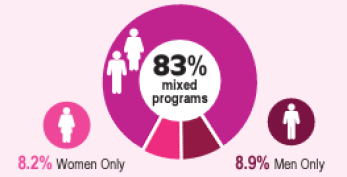

There is increasing interest and evidence for the use of cannabinoid medications in the treatment of cannabis use disorder, but little examination of the correlates of successful treatment. This paper is a secondary...
The COVID-19 emergency has tested the public health, medical, and public safety infrastructure of the United States (U.S.) in unprecedented ways. As the focal point for public health in their communities, local health...
This month on November 9th, 2022, the International Narcotics and Law Enforcement Affairs (INL) DDR Partners meeting offered a discussion on quality assurance and included two presentations:
Hubungan yang erat antara orang tua dan anak dan penerimaan orang tua dapat memediasi penerimaan diri yang tepat dari seorang remaja, yang merupakan variabel penting yang berkaitan dengan kepribadian dan pilar kesehatan emosional...
Contingency management (CM) is a psychological treatment based on operant conditioning. It consists of providing incentives in exchange for achieving a target behaviour such as abstinence or other treatmentrelated variables (e.g. session...
Electronic nicotine delivery systems (ENDS) generate an aerosol by vaporising e-liquids that usually consist of propylene glycol (PG), vegetable glycerine (VG), and other ingredients (water, nicotine, and flavours). The...
Di banyak negara, keluarga jarang terlibat dalam menangani pengobatan dan intervensi untuk anggota keluarga dengan gangguan penggunaan zat (SUDs). Tujuan dari penelitian ini adalah untuk mengukur pengaruh penggunaan zat pada...
Leisure can be a context that can promote positive adolescent development, but it can also be a context that contributes to adolescents engaging in risk behaviours.
The aim of this study is to determine the extent...
Summary
War in Ukraine has inevitably led to the country's health system functioning at reduced capacity. Attacks near hospitals and active military operations force people to change their place of residence and flee from the war to...
Canada’s Low-Risk Alcohol Drinking Guidelines were originally published by CCSA in November 2011 and were the result of the work of alcohol research experts in Canada. Since then, substantial new research on the association between alcohol...
The European Web Survey on Drugs1 collected data during March and May 2021 from people who use drugs, are aged 18 or older, and live in 21 EU and 9 non-EU countries including Lebanon. In this period, the populations in many European and...
In somatic health care settings, interdisciplinary collaborations (where various disciplines work coordinated and interdependently toward shared goals) are considered to yield higher team effectiveness than multidisciplinary...
Aftercare programs for people with substance use disorders (PWSUD) are frequently challenged with a number of overlapping obstacles, including uncertain policy consequences and a lack of resources. Despite demographic variety...
In the United States, access to buprenorphine remains low and disparities regarding who receives treatment have emerged. Federal laws have regulated buprenorphine delivery, ultimately limiting its implementation more broadly...
Beginning in the 1990s, non-medical use of prescription opioids (POs) became a major public health crisis. In response to rising rates of opioid dependence and fatal poisonings, measures were instituted to decrease the...
INTRODUCTION:
The European Prevention Curriculum (EUPC) and The Universal Treatment Curriculum (UTC) are paradigms of the efforts to achieve an international standardised training for drug demand reduction. Both curricula are based on...
BACKGROUND:
During the last ten years, Georgia made several important accomplishments in responding to the country’s drug problem. Specifically, in 2011, an interagency national drug coordinating body was established within the Ministry...
LATAR:
Kurikulum Perawatan Universal (UTC) ditawarkan kepada komunitas akademik untuk mengintegrasikan pengetahuan, keterampilan, dan praktik berbasis bukti khusus penggunaan zat ke dalam pengembangan profesional berkelanjutan dari...
INTRODUCTION:
Access to drug treatment services in Nigeria remains low due to a severe shortage in the drug treatment workforce. Plans are underway to address the workforce shortage by introducing drug addiction training programs in...
Share the Knowledge: ISSUP members can post in the Knowledge Share – Sign in or become a member